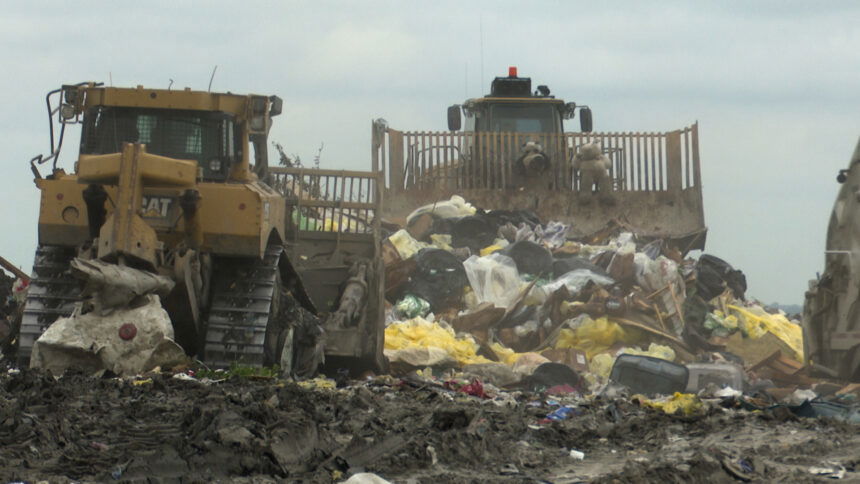St. Joseph’s Landfill to reach capacity in 2047: how recycling can make a big difference

ST. JOSEPH, Mo. (News-Press NOW) -- St. Joseph’s landfill is filling up fast, and the clock is ticking, with its projected lifespan being May 2047 according to landfill superintendent Darkota Cloud.
In the last decade, the St. Joseph Landfill has seen an increase in its usage, with the amount of trash received there doubling from almost 105,000 tons in 2015 to more than 215,000 tons in 2024.
According to landfill officials, the dump has received about the same amount of trash this year, compared to last.
The May 2047 deadline gives St. Joseph 22 years to determine where all the city's trash will be disposed of once the current landfill reaches capacity. The overall goal of city officials is to extend the landfill’s lifespan as long as possible.
The city just completed the construction of its Cell 8 infrastructure and began using it on Tuesday, July 29.
Now, the city said landfill staff have already begun construction on Cell 9 at the facility.
Opening a new landfill could take more than a decade and has proven politically difficult, as seen in the recent collapse of a proposed landfill in South Kansas City, Missouri.
Overflowing landfills don't prove to be just a space problem. They produce methane gas, a powerful greenhouse contributor that lowers oxygen in the atmosphere.
“St. Joseph’s landfill produces methane from over three million tons of waste, which our plant converts into enough electricity to power up to 1,000 homes each year,” Evergy’s 2024 sustainability report states. “Landfill gas is a renewable energy source that helps generate base load power.”
With space for trash being slim, officials are turning to solutions like waste management, ultimately leading to more recycling opportunities.
Recycling could significantly reduce how fast the landfill fills up, but participation needs to improve.
Advantage Metals, one of the few waste management services in St. Joseph, provides a place for residents to bring metal items for recycling and repurposing to get some extra money in their pockets.
Each year, the St. Joseph Recycling Center receives 600 tons of material, in stark contrast to the three million tons that are dumped into the landfill annually.
Materials are brought to the recycling center at no charge and are sorted and gathered, giving what some consider trash a second chance.
"I do think that it is important to change how big our footprint is, and if recycling can get that done, then that would be awesome," said Darkota Cloud, superintendent of solid waste and recycling, "And it really starts with the people at home."
What is Accepted at the Recycle Center:
- Tin/aluminum- rinsed lid-free food and drink containers
- Glass- (brown, green, clear) rinsed lid-free food and drink containers
- Corrugated cardboard (ripple board) - Flattened
- Magazines- Includes slick coated and ad inserts
- Newspaper- separated from office paper and magazines, dry, unbundled
- Mixed Paper -Copy paper or junk mail
- Free paper shredding of personal documents, limit 5 boxes/ bags please
- Plastics - (PET #1 & HDPE #2)- rinsed and separated milk, water, juice bottles, detergent and bleach bottles. Recycle number located on the bottom of the container, screw on containers ONLY.
- Oil/ Antifreeze Depository - vegetable, motor, lubricant, etc.
What Is Not Accepted:
- No Styrofoam or plastic bags are accepted
- No wax-coated cardboard, no chip board accepted (i.e, cereal or soda boxes)
All recyclables SHOULD be:
- Rinsed clean
- Have no lids
- No labels on Cans
- No Paper clips, rubber bands, staples, tape, adhesive labels, plastic tabs and plastic or wire spirals
Keeping recyclables clean and in good condition gives them a better chance of being reused.
"It helps divert recyclables from the landfill, and it encourages the lifespan of the landfill. It also promotes community wellbeing and it protects public health in general by keeping trash off the streets and doing the recycling, turning it into new things," said Andrea Miester, the supervisor at the Recycling Center.
After making a trip to the St. Joseph Recycling Center, most of the recyclables are then transported to the local regional processor, Birch Recycling, where they are densified or compressed.
From there, it is sold to major manufacturers who turn the recyclables into new products.
- Glass is crushed and recycled into insulation.
- Cardboard is turned into new cardboard.
- Newsprint is used to make insulation or egg cartons.
- Magazines are also repurposed into insulation.
- Mixed paper is recycled into tissue products.
- PET plastics, such as soda and water bottles, are transformed into carpet.
- Polyethylene containers, like milk jugs and detergent bottles, are made into plastic buckets and pails.
- Steel (tin) cans are recycled back into new steel products.
- Aluminum cans are reused to make new aluminum cans.
In a statement from Mike Birchmier, manager at Birch Recycling, under 2% of the recyclables brought in are lost in the production process.
A high percentage of the raw materials is repurposed into usable products. This process only works if materials are clean, properly sorted and free from contamination.
Currently, around 70% of plastic waste ends up in landfills or the natural environment.
Plastic can take hundreds or even thousands of years to break down, and glass could last millions of years. Eventually, our landfills will run out of space for both.
The St. Joseph Recycling Center sees 100,000 drive-through cars drop off recyclables annually, but this could still improve, according to the recycling supervisor.
Recycling reduces landfill space and conserves natural resources.
The recycling center also offers ways for members of the community to support and volunteer to help with recycling efforts. Visit their website here.




